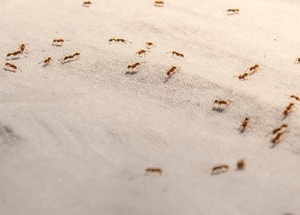What do ants eat and drink? The super-simple answer is everything. Drop an ice-cream cone in the middle of the park or leave a slice of pastrami on your porch and you’ll see ants gathering around it within an hour or so.
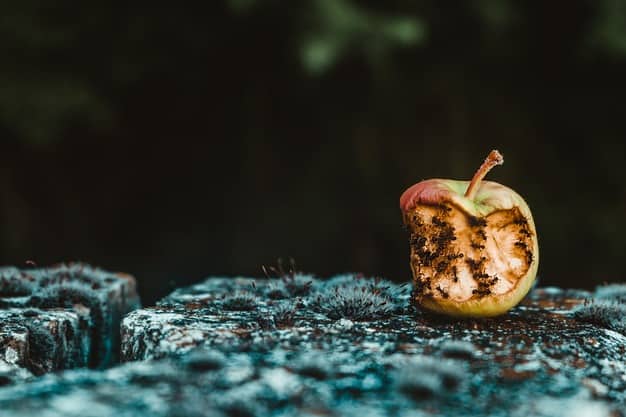
Don’t the tiny buggers care about their diet? Won’t they feel sick from the continuous mish-mash of flavors? And why do some ants eat hardwood while others prefer a sugar plum?
The answer to these and other questions lies in the fascinating biology of an ant.
All Mandibles, No Bite
With more than 12 species of ants on the globe, I am quite confident that everyone has seen an ant in their life, so I won’t waste anyone’s time describing what they look like.
You’ve seen they have a large head with a massive (relatively to their size) mouth, which is called a mandible. That’s probably how they chomp their meals, right?
Nope. Your typical run in the mill ant will use its mandibles to carry stuff around or pick a fight. And to be honest with you, with that strong jawline, who wouldn’t?
However, as intimidating as it may seem, an ant’s “mouth” is not well equipped for doing what a mouth does – biting and chewing. Most species of ants can’t consume hard food. They use their mandibles to break down the stuff they steal from others and then moisturize the bites with saliva until the snack is liquified enough to swallow. Not a simple process, I must tell you.
That’s why a lot of ants are attracted to sugar and sweets – sucking a candy is just that much better of an experience than crushing breadcrumbs. That being said, an ant won’t hesitate to eat a dead bug, a leaf, or even it’s fallen comrade for dessert.
What Do Ants Like to Eat Then?
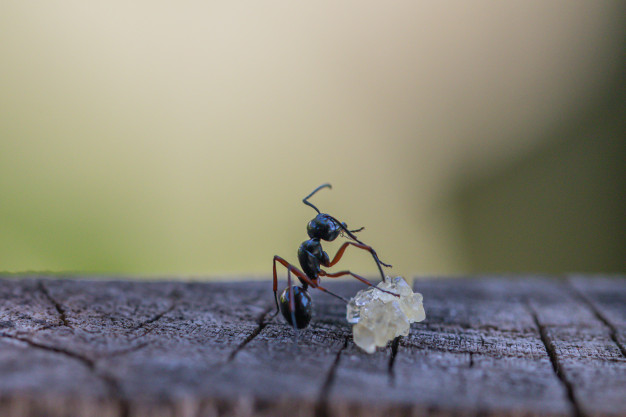
Given the plethora of ant species and the differences in their dietary preferences, most scientists have decided to divide the tiny soldiers into two primary categories. So, what do ants like to eat?
- Sugar lovers: Most ants fall into this category. Why? Think about it. Sugar is plentiful. Locating a source of nutrition is easy;
- Protein addicts: These bad boys are hunters as protein isn’t as easy to come across. It has to come either from a human-processed food or from another bug.
Most sources of manmade food contain sugar. Everything from bread to cereal is sweetened. Add the fact that aphids produce honeydew naturally and that there are sweet fruits all over the world, and you’ll get why, despite the ever-growing population, ants will probably never starve to death.
More on the matter, ants actually herd aphids to ensure a continuous stream of their sweet juice in the colony. Talk about an ant diet itch only honeydew can scratch!
As for the proteins, most ants just gather random dead bugs from all over and eat them. This is, by the way, one of the most balanced forces of nature I’ve had the pleasure of experiencing in my years of studies. Though the balanced wheel of life and death is slightly tinted by the fact that sometimes an ant’s food source is another ant. Not cool, bros!
How Do Ants Find Their Food?

Ants love sugar, one of the few foods that do not have a scent or even a particularly appetizing shape all by itself. So what makes an ant tick and how do they spot sugar crystals?
The answer is composed of two parts. One is more scientific and the other is, well, somewhat scientific in nature.
For starters, most insects have the ability to sense various chemical substances in the environment. It is called Chemosense. This is how those pesky mosquitoes tend to find your sweet spot – they follow the sweat.
Ants can do the same but with a much sweeter target.
The other reason why ants can quickly find sugar is dumb luck. There are billions upon billions of ants out there, most of which are on a 24/7 quest to get food for the colony. Their numbers increase the odds of finding a treat. And the seemingly organized food extraction mission you see in cartoons or on Natural Geographic is always a result of one lucky worker finding something worthwhile and pointing his brethren in the right direction.
Related Post: How to Get Rid of Sugar Ants for Good

But What About the Wood?
Ants are not termites. They do not consume wood. At least not in the traditional sense.
Though this doesn’t stop them from nesting on a wooden floor or something. Moreover, certain species, such as the carpenter ants, are a terrific roommate for this reason. The longer they share your space, the bigger the odds the roof is going to collapse on you from their mining expedition to extend the colony even further.
If you are looking to prevent carpenter ants from entering your home, follow these simple steps:
- No standing water. Make sure that the sinks are always dry, for an ant can always find food, but locating water is much more problematic for them;
- Don’t let loose tree branches connect to your house. Cut them if need be or they will become a bridge between your home and an invading army;
- Seal all the cracks in the exterior of your home;
- Don’t store your firewood or any additional wooden materials you don’t use often close to the house.
Common Misconceptions About an Ant’s Diet
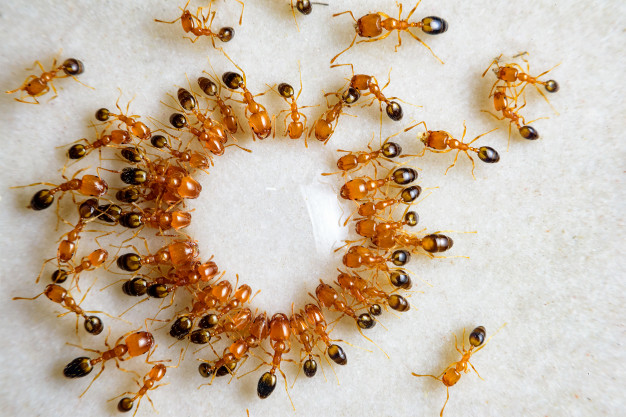
Most ants you see carrying leaves do not intend to either eat nor share them with others. Instead, ants, such as the leafcutter, turn the greens into their personal fields of harvest.
The ants will cut the leaves into small pieces, chew these pieces to a pulp, and then store the result with their feces. This ant-made farm will later produce a fungus the colony will actually eat.
As I’ve mentioned above, carpenter ants don’t eat wood. They throw away the leftovers forming small piles of dust around their nets. Little do they know that these dusty piles are a telltale sign warning the homeowner about the unwanted guests.
Thanks for the heads-up, carpenter ants… I guess.
Ant Diet and Baiting
Most pest exterminators take great advantage of an ant’s diet. The manufacturers produce long-lasting poisons that attract the little camps.
These poison granules or gel resemble sugary ant food, so any happy worker ant coming across the bait will target it for HQ delivery. Perhaps the little guy will even be rewarded.
Once the poison is in the colony’s nest, more ants will start both eating and spreading the toxin thus effectively eliminating their primary target – the queen, as well as every other ant in the colony.
Controlled annihilation. How is the US army force not finding these traps yet?
FAQ
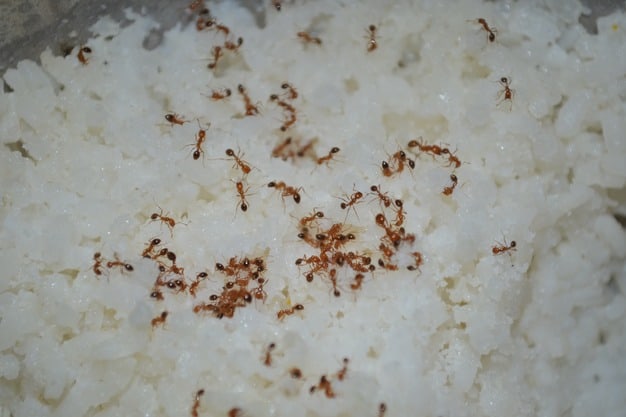
What is an Ant’s Favorite Food?
Ants are not picky eaters. They do not have a favorite food, though they prefer proteins and food rich in sugar.
Do Ants Eat Other Ants?
What are the things that eat ants, you ask? Other ants! Yes, those tiny hunters can eat their brethren, but they typically search for food sources that don’t fight back with giant mandibles.
Related Post: Best Ant Killers You Can Find on the Market Reviewed
Do Ants Eat Meat?
Yes, if they can come across a fresh slice.
Do Ants Eat Leaves?
Ants gather harvest leaves, but most of those are used in the construction of a colony, though a typical insect wouldn’t mind grabbing a bite. Ants also use the leaves they collect to feed their domesticated aphids, the tiny insects a colony cultivates to produce honeydew.
Do Ants Eat Fruit?
Yes, fruits are just the way ants like their food – soft and sweet.
Do Ants Eat Bread?
Yes, yes they do.
How to Keep Your Home Safe From Things Ants Like to Eat?
Alas, there is no feasible way of keeping your home safe from ant snacks. You’ll simply starve to death with no potential “ant food” in the vicinity. That being said, a daily dose of cleaning and a couple of ant baits scattered outside the house should do the trick just fine.
Remember to always:
- Seal your food;
- Hide the leftovers;
- Vacuum clean regularly;
- Take care of the garden;
- Keep moist areas (kitchen, bathroom) dry.
This way, you won’t be feeding any uninvited guests any time soon.
Also read:
References:
- Identifying household ants (Michael Merchant, Ph.D., Professor and Extension Urban Entomologist, Texas AgriLife Extension Service):
https://citybugs.tamu.edu/factsheets/household/ants-house/ent-2013/ - Carpenter ants (University of Minnesota Extension):
https://extension.umn.edu/insects-infest-homes/carpenter-ants

